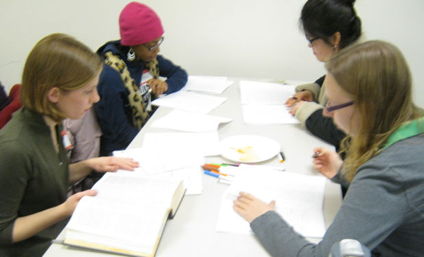
The sovereign Lord has given me an instructed tongue,
to know the word that sustains the weary.
He wakens me morning by morning,
Wakens my ear to listen like one being taught. (Isaiah 50:4, TNIV)
Over the years of working with graduate students and faculty at Ohio State, I’ve become convinced that one of the practices that can bring us release from distracted, frenetic, and fragmented lives is the practice of attentiveness to God. Some years back during a time of prayer when I was bombarding God with a list of concerns, I felt I almost audibly heard him say, “Be still and know that I am God” (Psalm 46:10a). Attentiveness, for me, began with realizing that the Lord is at the center of all things, and not me.
Attentiveness can help us as we transition to graduate school. I worked with undergraduate ministry for 20 years and when I transitioned to graduate school ministry, I discovered that I was more or less clueless as to the graduate and faculty culture of Ohio State. It was a kind of culture shock. I was greatly helped by some faculty and some of the first graduate students I worked with who patiently listened to my questions and explained to me the culture of their departments, the pressures of their lives, and the challenges they faced in following Christ. I went from thinking I knew a great deal about university ministry to starting from scratch. One of my fondest memories during this time was attending to God in weekly prayer with Lillie, Ramona, and a handful of graduate students who joined me in praying our graduate community into existence.
There often seems to be a great “disconnect” between our faith and our academic work. I deeply appreciate the good intellectual work being done by Christians in many disciplines to integrate faith and academic life. However, I am profoundly convinced that the most integrative practice we may pursue is that of prayerful attentiveness throughout the course of our workday. This was brought home to me a number of years ago as Amy shared with me her sense of being disconnected from God in her work. I asked her if she ever prayed as she sat down to work, or before teaching a class, or meeting a student. Her blank stare was followed by her curiosity as to why this never occurred to her. I think we ended up agreeing that this is one more example of the sacred-secular divide in our thinking that separates our work space and our “spiritual” space. Prayerful attentiveness is one of our most powerful weapons in destroying that divide. On at least two occasions in recent years, we have used retreats structured around praying the hours to teach the practice of weaving prayer into our days.
The practice of attentiveness not only makes us more aware of the presence of the Lord throughout our day. Prayerful attentiveness can also be a critical element in our scholarship. Many times over the years, we’ve seen the Lord illuminate thorny research problems as we’ve prayed for his insight into his created order. Recently, I was talking with a student who was considering forgoing her PhD because she couldn’t settle on a dissertation topic. We discussed pros and cons. One thing we discussed was asking God to give her something of a compelling interest if she was meant to stay. And, as we discussed what it would mean to be attentive to how the Lord might answer, we considered the idea of keeping a research journal in which she would note ideas from lectures, seminars, articles, or even random thoughts that caught her attention. I do not yet know how this will turn out but I believe her active attentiveness will give her clearer direction whether she stays or goes.

One way we teach attentiveness corporately is that every year we do a manuscript study series during one of our terms. In teaching about the importance of careful observation and questions, we highlight how the discipline of attentiveness—of observing to understand without forcing conclusions—can spill over into academic work. Furthermore, communal attentiveness to the common text can contribute to our communal attentiveness in academic research groups or subspecialties.
Finally, prayerful attentiveness leads us both into care for our community and into mission to the wider university as we keep asking and praying about “who is not here?” For one student, this means setting up lunch dates with people who are not in one of our small groups. For another, who cares deeply about racial reconciliation, it means leading an initiative with our black graduate and professional group on campus. For another, it has meant offering “Exploring Christianity” studies for seeking or curious internationals who we meet in New Student Outreach efforts. For our leadership this year, it has meant setting up a panel with Jewish, Muslim, and atheist students and our Council of Graduate Students to explore the question of Spirituality and Graduate Life together.
The notion of “following Christ” is central in our Graduate & Faculty Ministry. For me, this means following the one who is described in the words of Isaiah at the beginning of this piece. It is wonderful to consider that he literally wants us to listen for his teaching beginning from our waking moments through all the twists and turns of each day’s journey. Equally wonderful is the promise that we will know the words that sustain the weary—whether that be ourselves or others.